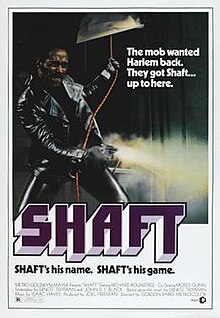| Shaft | |
|---|---|
 Theatrical release poster | |
| Directed by | Gordon Parks |
| Screenplay by | Ernest Tidyman John D. F. Black |
| Based on | Shaft by Ernest Tidyman |
| Produced by | Joel Freeman |
| Starring | Richard Roundtree Moses Gunn Charles Cioffi |
| Cinematography | Urs Furrer |
| Edited by | Hugh A. Robertson |
| Music by | Isaac Hayes Johnny Allen |
Production company | Shaft Productions |
| Distributed by | Metro-Goldwyn-Mayer |
Release date |
|
Running time | 100 minutes |
| Country | United States |
| Language | English |
| Budget | $500,000[2] |
| Box office | $13 million[3] |
Shaft is a 1971 American blaxploitation crime action thriller film directed by Gordon Parks and written by Ernest Tidyman[4] and John D. F. Black.[5] It is an adaptation of Tidyman's novel of the same name and is the first entry in the Shaft film series. The plot revolves around a private detective named John Shaft who is hired by a Harlem mobster to rescue his daughter from the Italian mobsters who kidnapped her. The film stars Richard Roundtree as Shaft, alongside Moses Gunn, Charles Cioffi, Christopher St. John, and Lawrence Pressman.
The film explores themes including masculinity and sexuality, with a specific emphasis on Black Power. It was filmed in Harlem, Greenwich Village, and Times Square within the Manhattan borough of New York City.[6] The Shaft soundtrack album, recorded by Isaac Hayes, was also a success, winning a Grammy Award for Best Original Score Written for a Motion Picture[7] and a second Grammy (shared with Johnny Allen) for Best Instrumental Arrangement. The "Theme from Shaft" won the Academy Award for Best Original Song, making Hayes the first Black man to win the award for that category.[8] The song has appeared on multiple Top 100 lists, including AFI's 100 Years...100 Songs.
A prime example of the blaxploitation genre,[9][10][11][12][13] it was selected in 2000 for preservation in the United States National Film Registry by the Library of Congress for being "culturally, historically, or aesthetically significant."[14] Shaft initially had two sequels called Shaft's Big Score! (1972) and Shaft in Africa (1973), though neither enjoyed the critical success of the original.
- ^ "Shaft – Details". AFI Catalog of Feature Films. American Film Institute. Archived from the original on December 1, 2018. Retrieved November 30, 2018.
- ^ Cite error: The named reference
timeboxowas invoked but never defined (see the help page). - ^ Hollywood Flashback: ‘Shaft’ Ignited a Blaxploitation Movie Craze in 1971 The Hollywood Reporter. Retrieved February 17, 2024.
- ^ "Ernest Tidyman | Writer, Additional Crew, Producer". IMDb. Retrieved 2023-09-29.
- ^ "John D.F. Black | Writer, Producer, Director". IMDb. Retrieved 2023-09-29.
- ^ Corkin, Stanley (2011). Starring New York: filming the grime and the glamour of the long 1970s. New York: Oxford University Press.
- ^ "GRAMMY Rewind: Watch Isaac Hayes Win Best Original Score Written For A Motion Picture for "Shaft" | GRAMMY.com". www.grammy.com. Retrieved 2023-09-29.
- ^ "Shaft (1971)". Gateway Film Center. Retrieved 2022-04-06.
- ^ Briggs, Joe Bob (Spring 2003). "Who Dat Man? Shaft and the". Cineaste. 28 (2). Archived from the original on 2016-03-04. Retrieved April 11, 2015.
- ^ Clark, Randall (2014) [1995]. At a Theater or Drive-In Near You: The History, Culture, and Politics of the American Exploitation Film. New York: Routledge. pp. 152–153. ISBN 978-0-415-83865-8.
- ^ Lev, Peter (2000). American Films of the 70s: Conflicting Visions. Austin: University of Texas Press. pp. 128–132. ISBN 978-0-292-74715-9.
- ^ Repino, Robert; Allen, Tim (June 3, 2013). "Blaxploitation, from Shaft to Django". Oxford University Press. Archived from the original on September 20, 2015. Retrieved April 11, 2015.
- ^ Stoddard, Brad L. (2013). "Shaft". In Cortés, Carlos E. (ed.). Multicultural America: A Multimedia Encyclopedia. Los Angeles: Sage Publications. pp. 1924–1925. ISBN 978-1-4522-1683-6.
- ^ "Complete National Film Registry Listing | Film Registry | National Film Preservation Board | Programs | Library of Congress". Library of Congress, Washington, D.C. 20540 USA. Retrieved 2023-03-09.